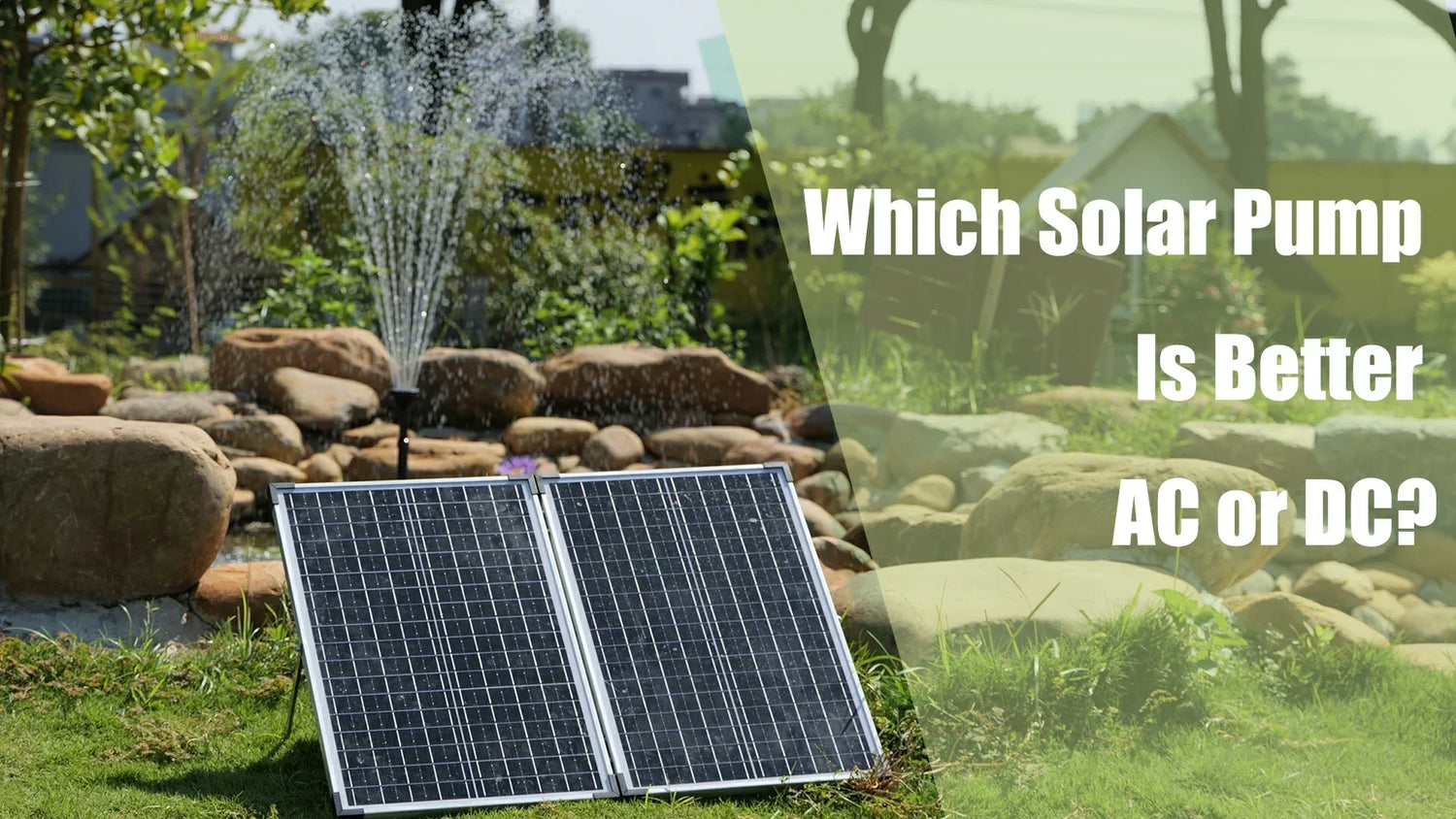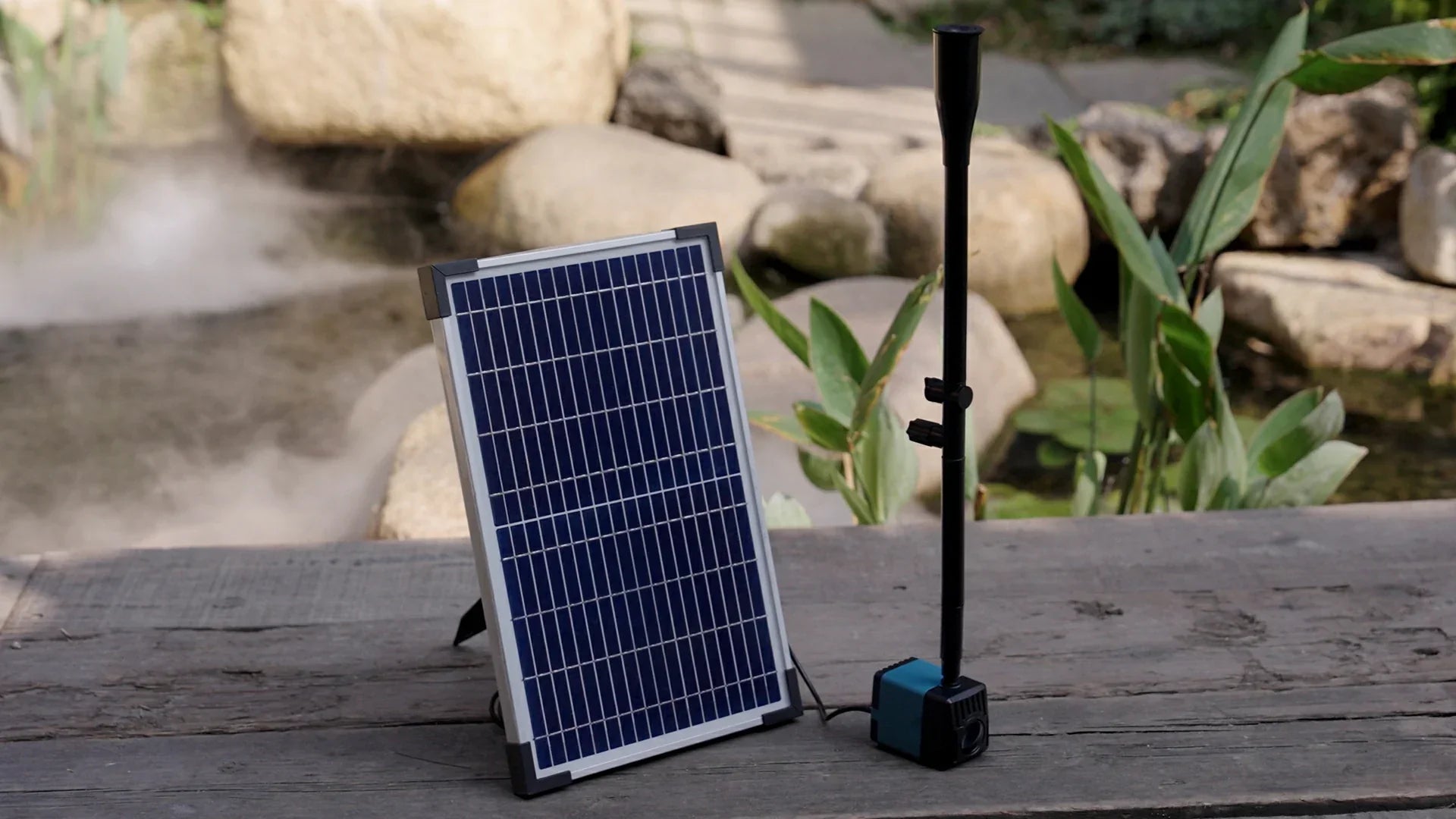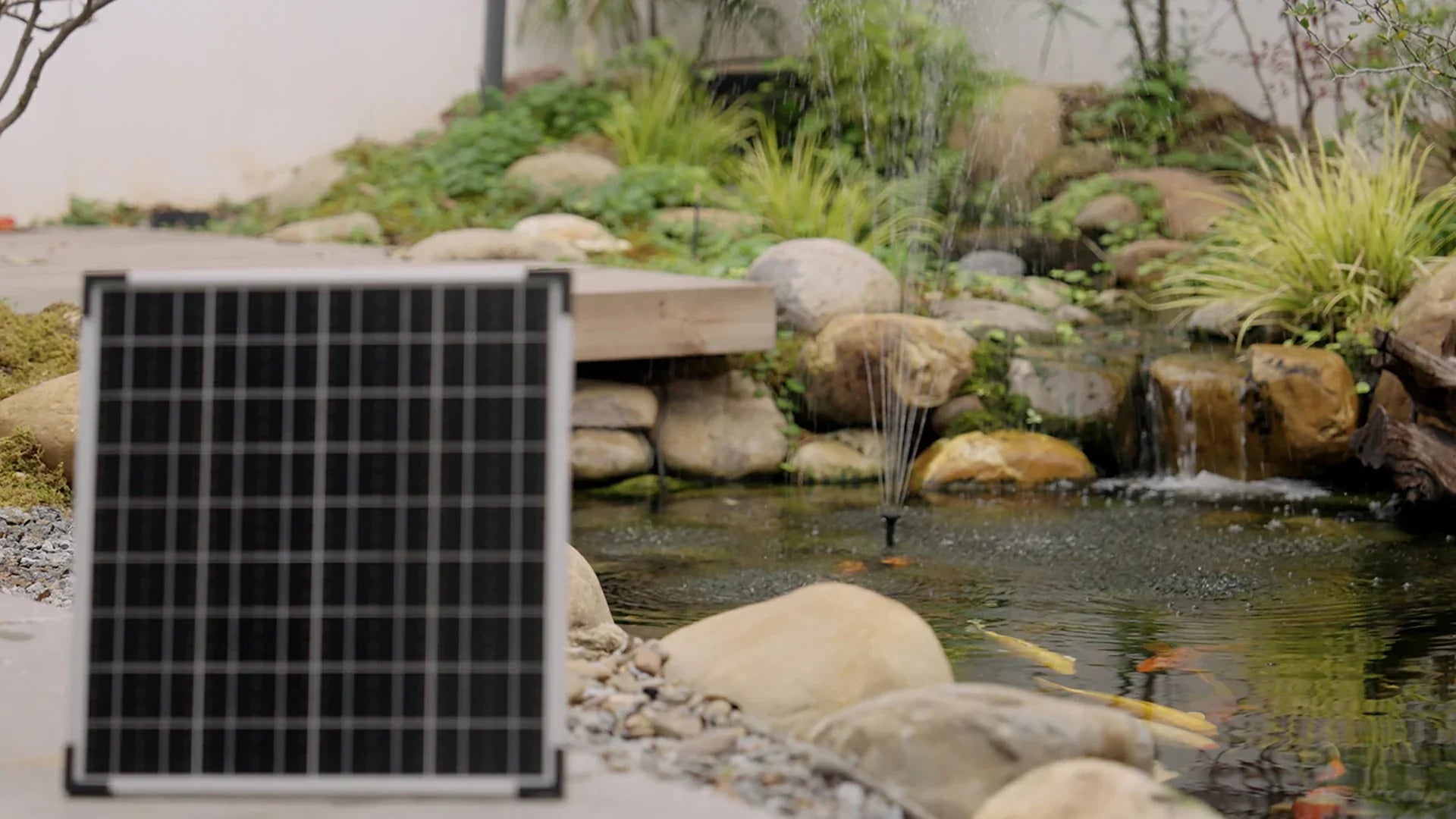Wenn Sie die Installation eines solarbetriebenen Springbrunnens oder Wassersystems planen, wird sich unweigerlich eine Frage stellen: Welche Solarpumpe ist besser, Wechselstrom oder Gleichstrom?
Auf den ersten Blick scheinen beide die gleiche Aufgabe zu erfüllen – sie pumpen Wasser mithilfe von Solarenergie. Doch hinsichtlich Effizienz, Leistung und Kompatibilität mit Solarmodulen kann der Unterschied zwischen Gleichstrom- und Wechselstrompumpen über Erfolg oder Misserfolg Ihres Systems entscheiden.
Ob Sie einen Gartenbrunnen, einen Gartenteich oder eine Tauchbewässerungsanlage betreiben – das Verständnis von Wechsel- und Gleichstrom-Solarpumpen hilft Ihnen bei der richtigen Auswahl. In diesem Fachartikel erklären wir die wichtigsten Unterschiede und zeigen, warum die Gleichstrom-Solarbrunnenpumpen von Poposoap die bessere Wahl für Haus und Garten sind.
AC- und DC-Solarpumpen verstehen
Solare Wasserpumpen lassen sich in zwei große Kategorien einteilen: AC (Wechselstrom) und DC (Gleichstrom).
- Wechselstrom-Solarpumpen wandeln mithilfe eines Wechselrichters Sonnenenergie in Wechselstrom um. Sie werden häufig für große Anwendungen oder für gewerbliche Zwecke eingesetzt, wo zusätzliche Spannung und Leistung benötigt werden.
- Gleichstrom-Solarpumpen werden direkt vom Solarpanel mit Strom versorgt, ohne dass eine Umwandlung erforderlich ist. Sie sind klein, effizient und ideal für den Hausgebrauch, beispielsweise für Gartenbrunnen und Fischteiche.
Kurz gesagt, AC-Systeme haben einen zusätzlichen Schritt – die Umwandlung von Gleichstrom aus Solarzellen in Wechselstrom –, während DC-Pumpen den von Ihren Solarzellen erzeugten Strom direkt nutzen.

Wesentliche Unterschiede zwischen Wechselstrom- und Gleichstrom-Solarpumpen
Wer die technischen und funktionalen Unterschiede zwischen Wechselstrom- und Gleichstrom-Tauchpumpen versteht, erkennt auch, warum die eine für unterschiedliche Zwecke geeignet ist:
-
Energieumwandlung:
- Wechselstrompumpen benötigen einen Wechselrichter zur Umwandlung von Sonnenenergie, wodurch Verluste entstehen.
- Gleichstrompumpen nutzen die Sonnenenergie direkt und bieten eine höhere Effizienz.
-
Energieeffizienz:
- Gleichstromsysteme sind typischerweise 15–25 % effizienter, da sie keine Umwandlungsverluste aufweisen.
- Wechselstromsysteme verbrauchen etwas mehr Strom und erzeugen mehr Wärme.
-
Installation:
- Wechselstrompumpen verfügen über zusätzliche Komponenten (Kabel, Regler, Wechselrichter).
- Gleichstrompumpen wie die Solarpumpen von Poposoap sind Plug-and-Play-fähig – einfach das Panel anschließen und los geht's.
-
Anwendung:
- Wechselstrompumpen werden für landwirtschaftliche Betriebe, Tiefbrunnen oder große Bewässerungssysteme eingesetzt.
- Gleichstrompumpen eignen sich perfekt für kleine Teiche, Ziergartenelemente und Springbrunnen.
Welche Solarpumpe ist die beste für Sie?
Für die meisten Hausbesitzer und Gärtner ist die Antwort einfach: Gleichstrom-Solarpumpen sind perfekt für den Einsatz in Wohnhäusern und Springbrunnen.
Sie sind kompakt, energieeffizient und für Niederspannung geeignet – dadurch sind sie sicherer und einfacher zu installieren. Die DC-Solarbrunnenpumpen von Poposoap eignen sich perfekt für Vogeltränken, Terrassenbrunnen und Miniteiche, da sie automatisch mit Sonnenlicht und ohne externe Verkabelung oder Netzanschluss betrieben werden können.
Alternativ eignen sich Wechselstrom-Solarpumpen für Anwendungen mit hohem Bedarf, bei denen große Wassermengen oder große Förderhöhen erforderlich sind – beispielsweise für die Wasserförderung in der Industrie oder Landwirtschaft.
Wenn Sie also einen ruhigen, freistehenden Gartenbrunnen wünschen, der ausschließlich von der Sonne angetrieben wird, ist DC die naheliegende Wahl.

Vor- und Nachteile von Wechselstrom- gegenüber Gleichstrom-Solarpumpen
Wechselstrom-Solarpumpe (Wechselstrom)
Vorteile:
- Ideal für Anwendungen mit hohem Leistungsbedarf.
- Kompatibel mit normalem Haushalts- oder Industriestrom.
- Kann mithilfe eines Wechselrichters sowohl mit Solarstrom als auch mit Netzstrom betrieben werden.
Nachteile:
- Benötigt einen Wechselrichter, was zusätzliche Kosten und Energieverluste verursacht.
- Weniger effizient bei der Umwandlung von Solarenergie.
- Kompliziertere Installation und Wartung.
Gleichstrom-Solarpumpe (Gleichstrom)
Vorteile:
- Funktioniert direkt mit Solarstrom – ein Wechselrichter ist nicht erforderlich.
- Höhere Effizienz und geringere Leistungsverluste.
- Leiser, sicherer und einfacher zu installieren.
- Ideal für kleine Wasserspiele und Springbrunnen.
Nachteile:
- Eingeschränkt geeignet für anspruchsvolle Einsätze oder große Tiefen.
- Möglicherweise muss das Gerät nachts abgeschaltet werden, sofern es nicht über eine Notstromversorgung verfügt.
Bei den meisten Garten- oder Terrasseninstallationen überwiegen die Einfachheit und Effizienz von Gleichstromsystemen den reinen Leistungsvorteil von Wechselstromgeräten bei Weitem.
Welche Solarpumpe ist effizienter?
Die Effizienz ist der Punkt, an dem sich Wechselstrom- und Gleichstrom-Solarpumpen am ehesten vergleichen lassen. In diesem Sinne ist Gleichstrom eindeutig im Vorteil.
Da Wechselstrompumpen einen Wechselrichter benötigen, geht bei der Umwandlung etwa 10–20 % der Energie verloren. Gleichstrompumpen umgehen diesen Schritt, indem sie den Strom direkt von Solarmodulen beziehen. Das Ergebnis ist:
- Schnellerer Start bei schlechten Lichtverhältnissen.
- Es wird weniger Wärme erzeugt.
- Gleichmäßigerer Durchfluss bei geringeren Stromverlusten.
Die DC-Solarpumpen von Poposoap verwenden bürstenlose Motoren mit geringerer innerer Reibung und längerer Lebensdauer – eine Konstruktion, die für den kontinuierlichen Außeneinsatz ausgelegt ist.
Vergleich aus der Praxis – Beispiel Gartenbrunnen
Nehmen wir an, Sie haben einen kleinen Gartenbrunnen, der von einer Solarpumpenanlage angetrieben wird.
- Bei Verwendung einer Wechselstrom-Solarpumpe benötigen Sie Solarpaneele, einen Wechselrichter und einen Spannungsregler. Selbst an sonnigen Tagen geht bei der Umwandlung Energie verloren, und der Springbrunnen sprudelt nur in kleinen Mengen.
- Bei einer Solarbrunnenpumpe mit Gleichstromanschluss wie der von Poposoap wird das Solarpanel direkt an die Pumpe angeschlossen. Sie schaltet sich bei Sonneneinstrahlung sofort ein und läuft den ganzen Tag geräuschlos. Dank eines Akkus als Backup läuft sie auch die ganze Nacht problemlos weiter.
Dadurch werden Gleichstromsysteme zuverlässiger, umweltfreundlicher und einfacher im täglichen Gebrauch.

Wartungs- und Lebensdauervergleich
Sowohl Wechselstrom- als auch Gleichstrom-Solarpumpen benötigen regelmäßige Reinigung und Wartung, wobei Gleichstromsysteme eine längere Lebensdauer haben, da sie weniger bewegliche Teile besitzen und weniger Wärme erzeugen.
- Klimaanlagenpumpen: Regelmäßige Überprüfung der Wechselrichter und weitere technische Arbeiten.
- Gleichstrompumpen: Einfache Wartung durch Spülen und Reinigen; die Modelle von Poposoap verfügen über filterbare Filter und wasserdichte Gehäuse für eine einfache Wartung.
Bei ordnungsgemäßer Wartung können Gleichstrom-Solarpumpen 3–5 Jahre oder länger halten, während die Wechselstromsysteme sehr stark von der Lebensdauer des Wechselrichters und der Qualität der Komponenten abhängig sind.
Häufig gestellte Fragen – Wechselstrom- vs. Gleichstrom-Solarpumpen
Frage 1: Was ist der Hauptunterschied zwischen einer Wechselstrompumpe und einer Gleichstrompumpe?
Eine Gleichstrompumpe wird direkt von Solarzellen betrieben, während eine Wechselstrompumpe einen Wechselrichter zur Stromumwandlung benötigt, was einen geringen Effizienzverlust mit sich bringt.
Frage 2: Welche Solarpumpe ist effizienter?
Gleichstrompumpen sind effizienter, insbesondere für kleine oder mittelgroße Systeme, da sie bei der Umwandlung keine Energie verlieren.
Frage 3: Funktioniert eine Gleichstrom-Solarpumpe auch ohne Sonnenlicht?
Ja, sofern sie mit einem Notstromsystem ausgestattet ist. Die akkubetriebenen Pumpen von Poposoap können stundenlang im Dunkeln laufen.
Frage 4: Sind Wechselstrompumpen leistungsstärker?
Im Allgemeinen ja. Wechselstrompumpen bewältigen höhere Drücke und Wassermengen, wodurch sie sich am besten für industrielle Anwendungen oder Tiefbrunnen eignen.
Frage 5: Was eignet sich am besten für einen solarbetriebenen Springbrunnen?
Eine Solarbrunnenpumpe mit Gleichstromanschluss ist besser – einfacher, sicherer und effizienter für den Einsatz im Haus oder Garten.
Fazit – Gleichstrom ist die beste Wahl für den Heimgebrauch, Wechselstrom für den harten Einsatz.
Beim Vergleich von Wechselstrom- und Gleichstrom-Solarpumpen hängt die beste Wahl von Ihren individuellen Bedürfnissen ab. Für alltägliche Gartenteiche, Springbrunnen und Vogeltränken sind Gleichstrom-Solarpumpen effizienter, einfacher zu installieren und langlebiger. Für landwirtschaftliche Betriebe, Brunnen oder großflächige Bewässerungssysteme sind Wechselstrom-Solarpumpen nach wie vor die leistungsstärkste Option.
Alle Solarbrunnen bei Poposoap sind mit modernen, bürstenlosen Gleichstrommotoren ausgestattet, die für einen leisen Betrieb, eine hohe Wasserleistung und geringen Wartungsaufwand sorgen. Diese Pumpen vereinen Leistung und Nachhaltigkeit – ein Brunnen, der Tag und Nacht von Sonnenaufgang bis Sonnenuntergang ausschließlich mit Sonnenenergie sprudelt.





Hinterlasse einen Kommentar
Alle Kommentare werden vor der Veröffentlichung geprüft.
Diese Website ist durch hCaptcha geschützt und es gelten die allgemeinen Geschäftsbedingungen und Datenschutzbestimmungen von hCaptcha.